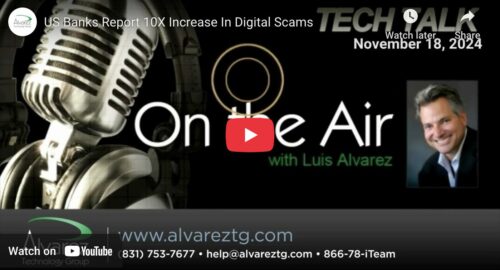How to Spot COVID-19 Scams
In a recent radio interview discussing scams involving stimulus checks and SBA loan, CEO of Alvarez Technology Mr. Luis Alvarez encapsulates the COVID-19 pandemic entirely in one sentence: “The bad guys won’t let a crisis go to waste.”

Alvarez further describes scammers offering to help desperate business owners fill out their SBA loan application. “These hucksters will claim to be working for a governmental department associated with the SBA. They’ll ask you to give them information about your business and your bank accounts. After completing the phone call, scammers will use this info immediately to receive SBA loans they should not be receiving”.
In addition to warning of COVID-19 scams involving stimulus funds or SBA loans, Alvarez warns that if you are scammed out of receiving a stimulus payment or loan, the government will not issue you another payment or loan. Also, anyone filing taxes in 2018 and 2019 has already given the IRS all the information needed to send stimulus payments. Never provide personal or financial information to anyone on the phone or over a website claiming they require this information to send funds either by direct deposit or check.
“Because That Is Where the Money Is”
Serial robber Willie Sutton was once asked why he chose to spend half his life in prison by robbing banks for 40 years. Sutton supposedly replied, “well, that’s where the money is.” Scammers view stimulus checks, SBA loans, and other government-provided financial assistance the same way Sutton observed banks–it’s merely where a lot of money is located and easily accessible.
Avoid being the victim of COVID-19 scams by remaining alert for the following:
- Phishing emails claiming you have qualified for COVID-19 “grants.” Currently, the government is not offering grants. Fake claims on social media are targeting seniors about grants meant to pay medical bills. When people click the link, they are taken to a scam website purporting to be the “U.S. Emergency Grants Federation.” No such department exists. However, the website asks victims for their social security number so they can verify their identity.
- Scammers are emailing or calling victims with promises of qualifying for extra stimulus money if they share financial and personal information.
- Stimulus checks appearing in your mailbox. No paper checks have been distributed yet, and the Treasury Department has said they likely won’t begin issuing paper stimulus checks until June
Anyone believing they have been scammed out of their stimulus payment or SBA loans should report the incident to the Federal Trade Commission.
No company can afford to be vulnerable and unprotected against COVID-19 scammers. Contact the Alvarez Technology Group today to learn more about our services.





